Now, it is the season when strawberries are on the market in large quantities. In the fields of Linquan County, Anhui Province, strawberries are neatly arranged. From a little red to a piece of red, from a village to a region rich, in recent years, Linquan County has vigorously developed the strawberry planting industry, which not only drives villagers to get rich, but also makes the countryside look new and paints a new picture of "Berry" good countryside. Take a bite of spring and follow the reporter to explore the "wonderful recipe for wealth" hidden in the strawberry greenhouse.
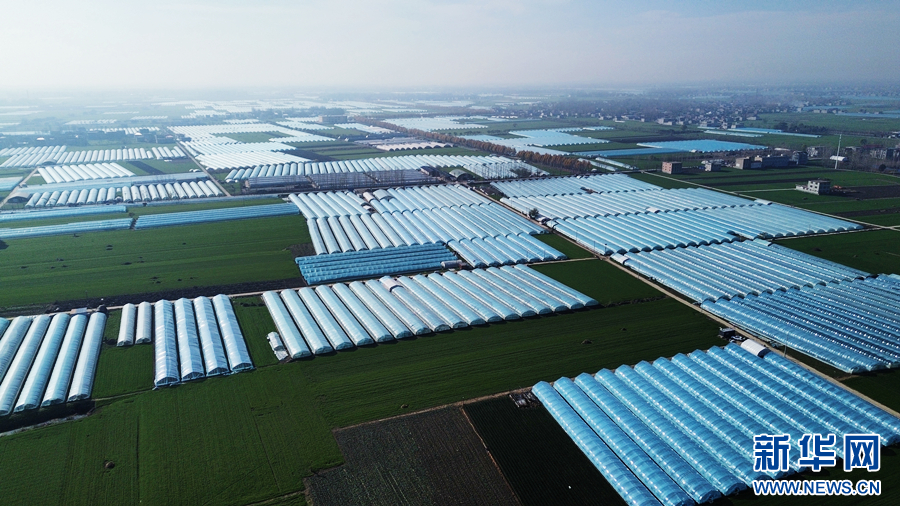
Linquan County Strawberry Planting Base. Xinhuanet (photo by Zhao Huaiyong)
Strawberry "Yinghong" income growth road
Walking into Qianwa Village, Huangling Town, Linquan County, there are many greenhouses next to each other.
"The soil here is fertile, the climate is mild, the rainfall is abundant, the sun is sufficient, the summer is hot and rainy, and the winter is dry and there is less snow, which is very suitable for growing strawberries." Hou Baoquan, a strawberry grower in Qianwa Village, introduced.
A few years ago, Hou Baoquan, who was working in another place, returned to his hometown. After many inspections and repeated considerations, he set his sights on growing strawberries. From the first one or two acres to the current thirty acres, Hou Baoquan has gradually tasted the sweetness of growing strawberries.
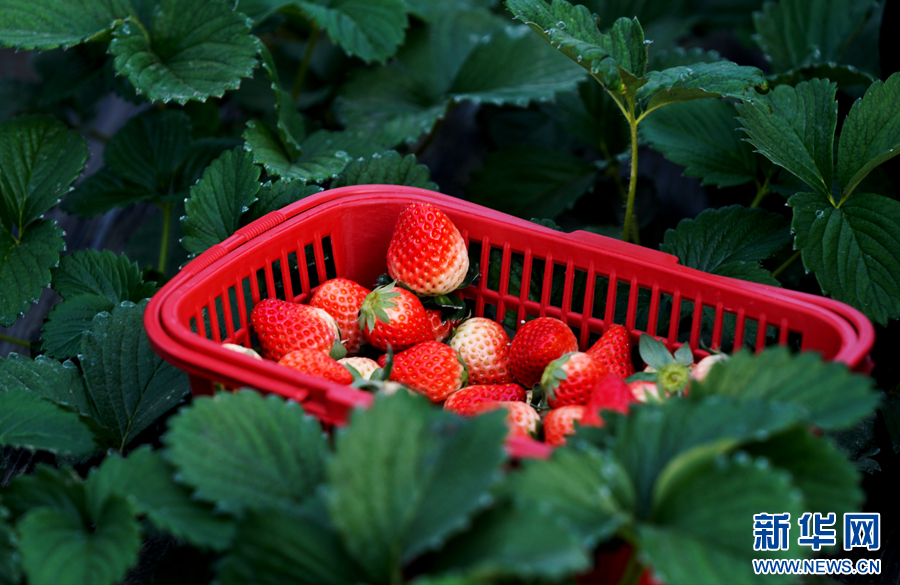
Sweet and sour strawberries. Xinhuanet (photo by Zhao Huaiyong)
"The economic benefits of growing strawberries are quite high and the results are fast." Hou Baoquan said happily. Soon, under his leadership, the villagers began to follow suit, and the village started to "plant strawberry craze".
In order to expand the strawberry industry, Qianwa Village has comprehensively improved infrastructure and public service facilities such as roads, villages, and environment. In 2024, the steel structure greenhouse construction project with an investment of 26.32 million yuan in Linquan County was put into use.
At present, 14 villages in Huangling Town have achieved full coverage of strawberry planting. There are 437 strawberry growers in the town, 4,754 strawberry greenhouses are built, with a planting area of more than 10,000 mu, with an annual output of nearly 20,000 tons of fresh fruits, and an output value of about 400 million yuan.
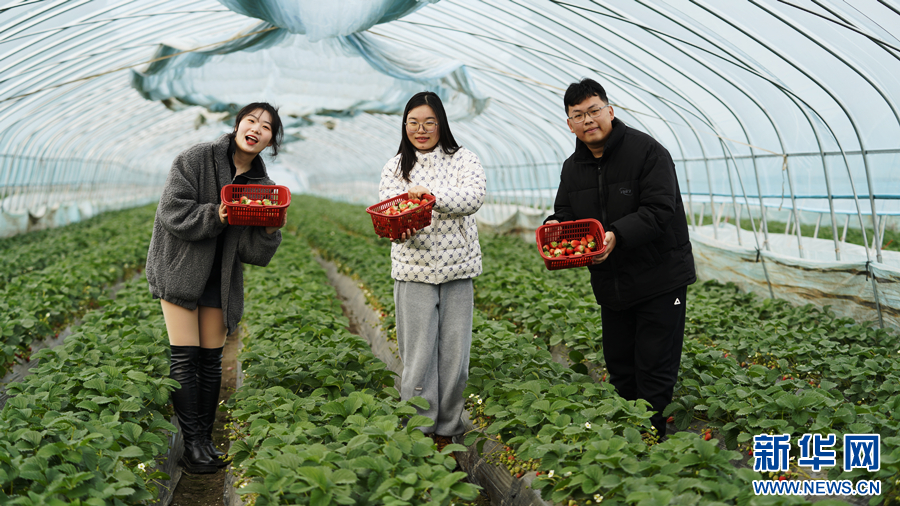
Tourists display picked strawberries. Xinhuanet (photo by Zhao Huaiyong)
Strawberries "stacked" to create wealth bridge
In the newly built "Jinyuan Mizhile Strawberry Sorting Center" in Qianwa Village, the trays specially placed for strawberries are neatly placed, and electronic scales, accounting desks, inspection tables, etc. are lined up.
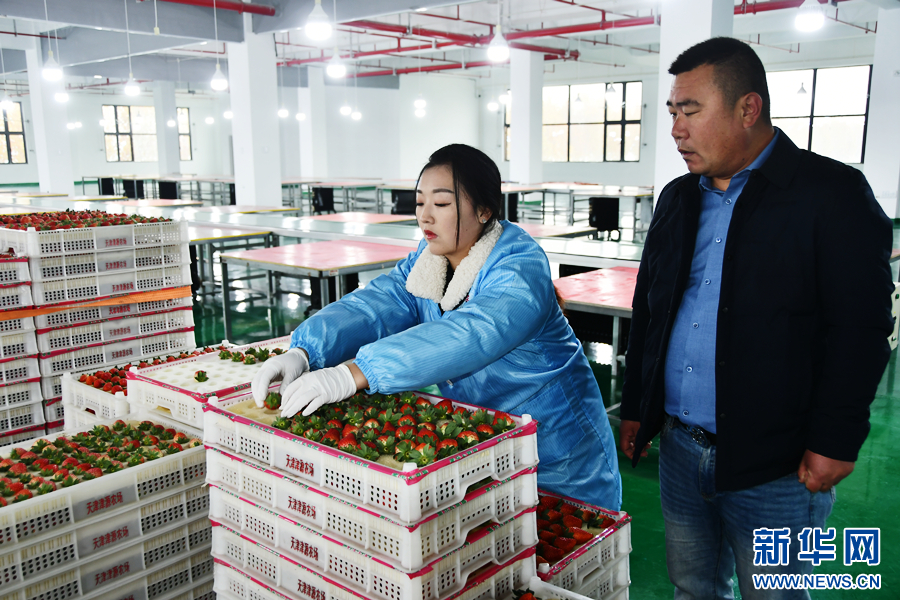
Staff are sorting strawberries. Xinhuanet (photo by Zhao Huaiyong)
"This sorting center invests 21 million yuan and covers an area of 8,400 square meters. It is a supporting facility of the agricultural industrial park invested and built by the county finance." Pei Zile, the head of the sorting center, said that the strawberries here are purchased during the day, sorted in the evening, and transported at night. The next morning will appear in wholesale markets and supermarkets in Guangzhou, Changsha, Hangzhou and other places.
"In the past, the strawberries grown by fruit farmers were sold. There were many purchase points, and the prices fluctuated greatly." Pei Zile said, "Now there is a standardized trading market, with transparent prices, open information, and fair transactions. Fruit farmers just need to plant strawberries with peace of mind."
The quality of the product is very important whether the market is good or not. To this end, Huangling Town has registered the "Huangling Strawberry" trademark and established an agricultural product quality supervision station, equipped with various quick inspection equipment, and conducted random inspections of each batch of strawberries on the market to ensure the quality of the product.
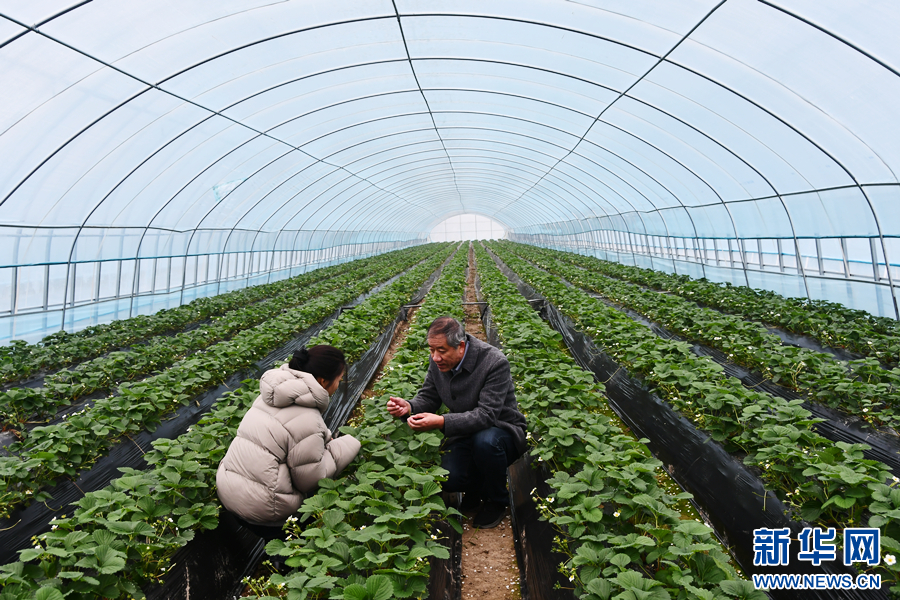
Technical experts guide villagers to grow strawberries. Xinhuanet (photo by Zhao Huaiyong)
In order to promote the development of the strawberry industry, Linquan County has also vigorously promoted scientific planting methods to "build" the bridge of wealth for villagers. The county has selected a large number of science and technology commissioners to go deep into various villages to provide technical consultation, helping the people solve technical problems, and giving wings to take off for product quality and industrial development.
Strawberries hold up a good day
Not long ago, the second Strawberry Festival in Linquan County opened in Huangling Town, attracting nearly 100,000 people and tourists to pick strawberries, go to the market, and appreciate acrobatics. Various activities are colorful and have become a highlight of county tourism.
"By holding the Strawberry Culture Festival, we have worked hard to make Huangling strawberries a broader market and allow the general public to enjoy the happiness and happiness brought by the strawberry industry." said Wang Chunwu, Secretary of the Party Committee of Huangling Town.
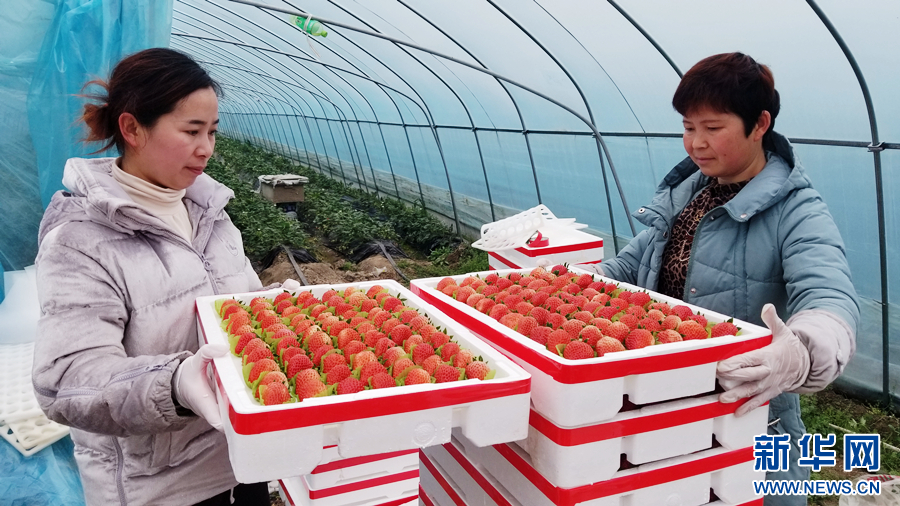
The villagers are packing strawberries in boxes. Xinhuanet (photo by Zhao Huaiyong)
It is understood that in 2023, Linquan County's strawberry achieved sales revenue of about 450 million yuan, absorbed about 13,000 people to find direct employment, and the per capita income increased by about 6,000 yuan.
Not only benefited from the planting process, the good quality of Linquan strawberries has also attracted merchants from Beijing, Tianjin, Henan, Jiangsu and other places to come and acquire, leading more than 2,000 local people to engage in sorting, packaging, transportation and other work.
"The purpose of our development of the strawberry industry is to enable the people to increase their income and live a good life, cultivate the pillar industries of rural revitalization, and allow the village-level collective economy to continue to grow." Wang Chunwu said that the next step will be to vigorously develop rural e-commerce, broaden strawberry sales channels, and continuously expand the popularity and influence of Huangling strawberries. (Reporters Wang Ying, Feng Wenya, Li Dongbiao, Zhao Huaiyong)